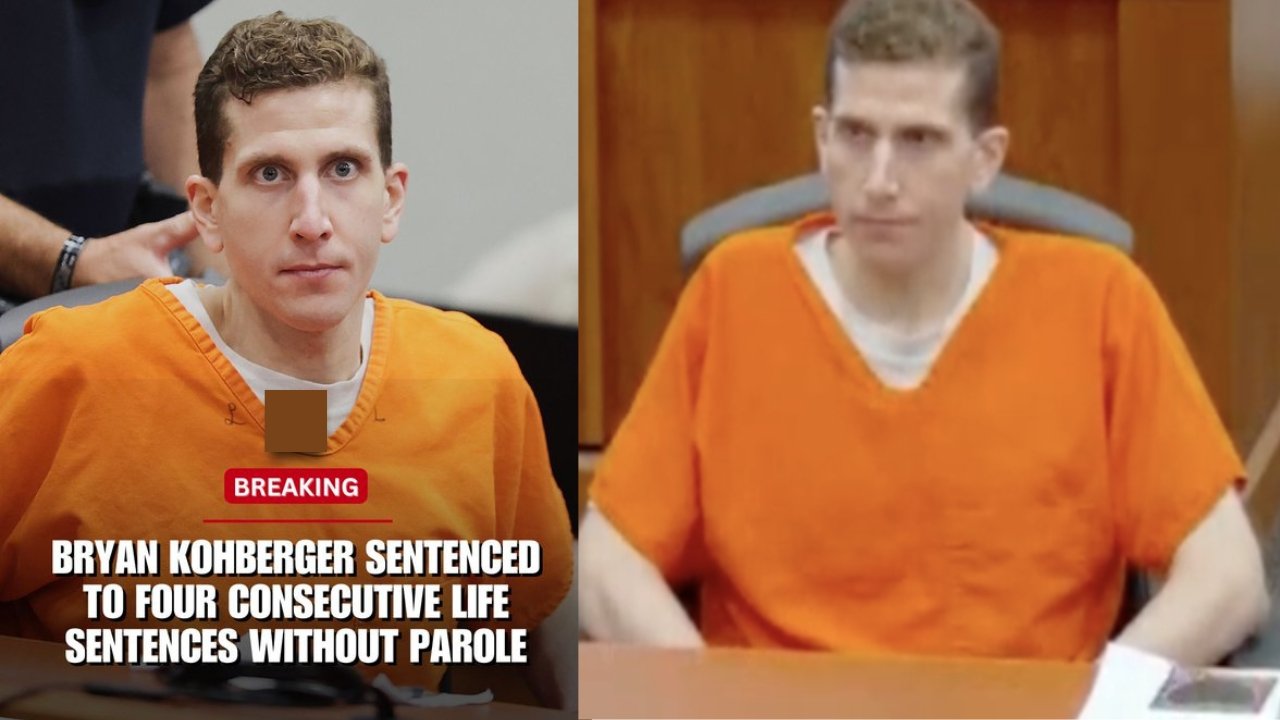Bryan Kohberger Sentenced to Life Without Parole for Idaho Student Murders
Bryan Kohberger, a 30-year-old former criminology Ph.D. student, has received a sentence of four consecutive life terms without the possibility of parole for the brutal 2022 murders of four University of Idaho students. Judge Steven Hippler handed down the sentencing on July 23, 2025, at the Ada County Courthouse in Boise, marking the culmination of a nearly three-year legal saga that gripped the nation. Kohberger’s guilty plea earlier this month, part of a deal to avoid the death penalty, brought mixed reactions from the victims’ families and left lingering questions about his motives unanswered.
The Crimes and Investigation- Bryan Kohberger
On November 13, 2022, Kaylee Goncalves (21), Madison Mogen (21), Xana Kernodle (20), and Ethan Chapin (20) were found stabbed to death in their off-campus rental home at 1122 King Road in Moscow, Idaho. The gruesome killings shocked the small college town and drew national attention due to their brutality and the seemingly random nature of the attack. Two roommates, Dylan Mortensen and Bethany Funke, survived the incident, with Mortensen later recounting seeing a masked figure in the house that night.
Kohberger, a graduate student at nearby Washington State University, emerged as a suspect after a meticulous investigation. Key evidence included DNA found on a KA-BAR knife sheath left at the crime scene, surveillance footage of a white Hyundai Elantra matching Kohberger’s vehicle, and cellphone records placing him near the victims’ home multiple times in the months leading up to the murders.
Prosecutors revealed that Kohberger purchased the knife online eight months prior and took steps to cover his tracks, leveraging his criminology studies to plan the attack. A Q-tip discarded by Kohberger’s father in Pennsylvania provided DNA that linked him to the crime scene, sealing his identification as the prime suspect. He was arrested on December 30, 2022, at his family’s home in Albrightsville, Pennsylvania.
The Guilty Plea and Plea Deal
After maintaining his innocence for over two years, Kohberger unexpectedly pleaded guilty on July 2, 2025, to four counts of first-degree murder and one count of burglary. The plea deal, finalized just weeks before his trial was set to begin on August 11, spared him from the death penalty in exchange for life sentences. According to prosecutors, Kohberger waived his right to appeal or seek leniency, and the state will seek restitution for the victims’ families.
Prosecutor Bill Thompson provided a detailed account of the crime during the plea hearing, describing how Kohberger entered the home through a sliding glass door, stabbed Mogen and Goncalves on the third floor, and encountered Kernodle in a hallway, leading to her and Chapin’s deaths. While prosecutors believe Kohberger intended to kill, they noted he may not have planned to target all four victims. A car identified as Kohberger’s was seen speeding away from the scene at 4:20 a.m., and he returned to his apartment in Pullman, Washington, by 5:26 a.m.
The plea deal divided the victims’ families. Madison Mogen’s mother and stepfather, Karen and Scott Laramie, supported the agreement, stating it provided closure and allowed them to “turn from tragedy and mourning to the light of the future.” However, Kaylee Goncalves’ family, particularly her father, Steve Goncalves, expressed outrage, calling the deal a “secretive” betrayal by prosecutors. Steve Goncalves told ABC News he felt he had let his daughter down, lamenting the lack of a full confession or details about the murder weapon’s location.
Sentencing and Victim Impact Statements
On July 23, 2025, Kohberger faced the victims’ families and survivors in a packed Boise courtroom. Judge Hippler sentenced him to four life terms for the murders, plus 10 years for burglary and $270,000 in fines, describing the killings as an “unfathomable, senseless act of evil.” Hippler expressed frustration over Kohberger’s refusal to disclose his motive, noting that focusing on the “why” only gives him relevance. When offered the chance to speak, Kohberger declined, saying, “I respectfully decline,” leaving his reasons for the murders a mystery.
Victim impact statements delivered by family members and survivors were emotional and raw. Dylan Mortensen, one of the surviving roommates, spoke through tears, describing a dream where she said goodbye to her slain friends. “He took their lives, but I will continue to try to be like them to make them proud,” she said, calling Kohberger a “hollow vessel.”
Bethany Funke, the other surviving roommate, expressed fear that Kohberger might have targeted her next. Kaylee Goncalves’ sister, Alivea Goncalves, confronted Kohberger directly, labeling him a “sociopath, psychopath, murderer” and demanding answers about why he chose her sister. Steve Goncalves emphasized that the world was watching because of the victims, not Kohberger, saying, “No one cares about you.”
Xana Kernodle’s father, Jeff Kernodle, expressed disappointment that the plea deal did not require Kohberger to provide more details. Ethan Chapin’s parents, Jim and Stacy Chapin, supported the plea deal, with Stacy stating she “wanted to do a handstand” upon hearing it, as it avoided a grueling trial. The courtroom erupted in applause after some statements, reflecting the community’s pent-up grief and anger.

New Details and Unanswered Questions
Newly released documents from the Moscow Police Department, unsealed after the sentencing, shed light on the investigation and the crime’s brutality. Xana Kernodle suffered over 50 stab wounds, many defensive, indicating she fought back. Kohberger’s first police interview after his arrest revealed small talk with officers, but he requested a lawyer when pressed about the murders.
A former friend described him as “intelligent but selfish,” while a Washington State University classmate reported seeing photos of herself on Kohberger’s phone, taken from her public Instagram account. Kohberger’s injuries around the time of the murders, including a facial scratch and knuckle wounds, raised suspicions, though he claimed they were from a car accident.
Despite the guilty plea, critical questions remain unanswered. Investigators believe the house was deliberately targeted, but the motive is unknown. The murder weapon, a knife, was never recovered, and no social media connections were found between Kohberger and the victims.
Prosecutors dispelled rumors of links to local businesses like the Mad Greek restaurant or a figure named “Pappa Rodger.” Moscow Police Chief Anthony Dahlinger admitted at a post-sentencing press conference that some aspects of the case, including the knife’s location, may never be resolved.
Public and Legal Reactions
The case’s resolution prompted varied reactions. President Trump, in a Truth Social post, criticized the plea deal and urged Judge Hippler to force Kohberger to explain his actions, calling the murders “vicious” and decrying unanswered questions. A coalition of news organizations, including The Associated Press, successfully petitioned to lift a gag order on July 17, 2025, citing the absence of a trial. The lifting of the gag order allowed for the release of over 300 previously sealed investigation files, providing new insights into the case.
Kohberger’s family, including his sister Amanda, who attended the sentencing, requested privacy. His mother appeared emotional during the victim impact statements. Posts on X reflected ongoing public interest, with some users speculating about Kohberger’s mental state or motives, though these remain unverified.
Moving Forward
Kohberger will serve his sentence in a maximum-security prison, with reports suggesting harsh conditions await him. The Moscow community and the victims’ families now face the challenge of healing. Moscow Police Chief Dahlinger expressed hope that the sentencing brings closure, stating, “Our hope is that not only the families, but the friends, even the Moscow community and all the communities that were affected by this, can start to heal.”
The case, marked by its brutality and the enigmatic profile of a criminology student turned killer, leaves a lasting impact. While justice has been served in the form of life imprisonment, the absence of a clear motive continues to haunt those touched by the tragedy. As Steve Goncalves said, “Today we are here to finish what you started … and to prove to the world that you picked the wrong families.”














Post Comment